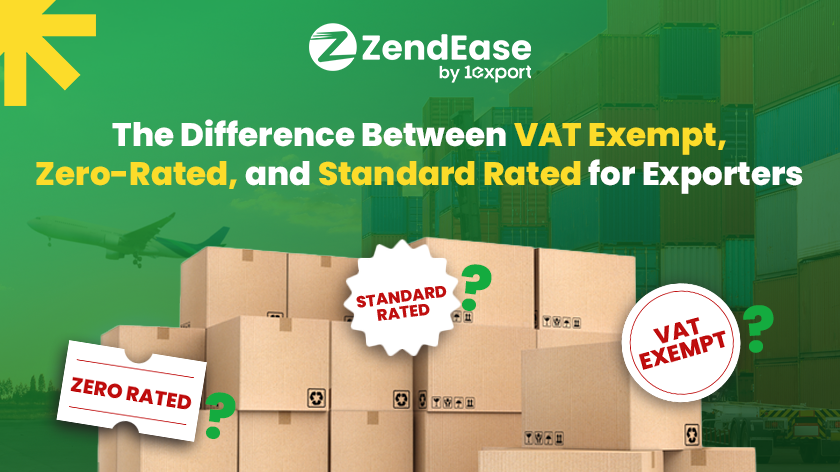VAT-Exempt vs Zero-Rated vs Standard-Rated: A Simple Guide for Philippine Exporters
Helping SMEs Understand Philippine Tax Rules for Smoother International Trade
by Jennifer Victoria Garrucho on Sep 30, 2025

If you’re a Philippine SME exporting products overseas, whether by air freight or sea freight, you’ve probably come across terms like VAT-exempt, zero-rated, and standard-rated. These export tax classifications play a crucial role in Philippine exports, as they impact pricing, compliance requirements, and overall profit margins.
Understanding how these taxes work is crucial for SMEs seeking to remain competitive and compliant in the global market. But what do these classifications really mean, and how do they apply to exporters like you?
Let’s break them down in simple terms.
What is VAT and Why Does It Matter for Exporters?
Before looking at the classifications, it’s essential to understand VAT itself. VAT (Value-Added Tax) is a 12% tax applied to most goods and services in the Philippines. For exporters, knowing how VAT works is critical because:
- It affects your final selling price.
- It determines how much tax you pay or don’t pay on exported goods.
- It influences your documentation and BIR compliance.
ZendEase can guide SMEs through BIR VAT rules for exporters, helping avoid overpayments or costly delays in overseas shipping.
VAT-Exempt: When No VAT is Charged
The first category is VAT-exempt. This means your sale is not covered by VAT at all, so you don’t add the 12% tax to your price. However, there’s a trade-off: because the transaction is exempt, you also cannot claim back any VAT you may have already paid on business purchases (like supplies or materials) related to that sale.
How it works:
- If your product is VAT-exempt, you don’t need to worry about adding VAT to your invoice.
- But if you bought raw materials and paid VAT for them, you won’t be able to recover that tax later.
Examples for Exporters:
- Selling goods explicitly listed as exempt under Philippine law (like unprocessed agricultural products).
- Running a small-scale business with total annual sales below the BIR’s VAT registration threshold.
Key points for SMEs:
- No VAT is added to your invoice.
- No VAT refund is available for your business expenses.
This setup can simplify compliance for small businesses or for certain exempt goods, but it also means you may lose the chance to recover input VAT.
While VAT-exempt transactions sound simple, things get more complex with zero-rating.
Zero-Rated: VAT at 0% for Qualified Export Sales
Zero-rated is different from exempt. With zero-rated sales, the VAT rate is set at 0%, but unlike VAT-exempt transactions, you can still claim back the VAT you paid on your business expenses. This makes it especially valuable for exporters engaged in Philippine shipping or working with freight forwarding services in the Philippines.
How it works:
- You don’t charge VAT to your foreign buyers, so your product stays competitively priced.
- At the same time, if you already paid VAT on raw materials, freight services, or logistics, you can get a refund or credit from the BIR.
Examples for Exporters:
- Exporting goods from the Philippines directly to international buyers.
- Certain sales to export enterprises registered with investment promotion agencies.
Why it matters:
- Keeps your invoices VAT-free for overseas buyers.
- Allows you to recover input VAT, improving your cash flow.
ZendEase can help SMEs by reviewing documentation for VAT zero-rated sales in the Philippines — ensuring the paperwork meets BIR requirements — and reducing the risk of delays.
But not every export-related transaction qualifies for exemption or zero-rating. This is where standard-rated comes in.
Standard-Rated: When the 12% VAT Applies
The third category is standard rated, which means your sale is subject to the regular 12% VAT. Unlike VAT-exempt or zero-rated transactions, this is the most common tax treatment for sales within the Philippines.
How it works:
- You add 12% VAT to your invoice, which increases the buyer’s total cost.
- The good news is that you can still claim input VAT credits on business expenses related to those sales.
Examples for Exporters:
- Selling to a domestic buyer who will later export the goods themselves.
- Providing services that don’t qualify for zero-rating.
Impact:
- Increases your invoice total by 12%.
- Allows you to claim input VAT credits on related expenses.
With three possible VAT treatments (VAT-exempt, zero-rated, and standard-rated), the next question is: how do you know which one applies to your business? Let’s break it down in the following section.
How to Know Which VAT Treatment Applies
The correct VAT classification for exporters depends on:
- Nature of your product or service.
- Where your buyer is located.
- Type of transaction (direct export, indirect export, or local sale).
- BIR documentation and approvals.
Accurate classification is essential for Philippine exporters because it ensures VAT compliance and helps prevent costly errors. ZendEase can advise on the correct VAT category for your transactions and guide SMEs in staying compliant with BIR requirements when handling overseas shipping.
Beyond compliance, VAT classification also affects your finances and competitiveness. The right treatment can improve cash flow, strengthen your pricing strategy, and help your business stand out in global markets.
Why Getting VAT Right Saves You Time and Money
- Avoid penalties: Wrong VAT treatment can lead to tax assessments
- Boost cash flow: Zero-rated sales let you recover input VAT.
- Stay competitive: Correct VAT handling enables you to price more effectively in international markets.
With so much at stake, expert guidance can make the process smoother.
Helping SMEs Stay VAT-Compliant with Ease
Whether you’re exporting to the US, Canada, or other markets, VAT rules can feel complicated — but you don’t have to handle them alone.
You can book an online consultation or visit our office at 104 V.A. Rufino Street, Makati, for in-person assistance and consultations.
Book your consultation today and let ZendEase help you stay compliant, save money, and succeed in international trade.